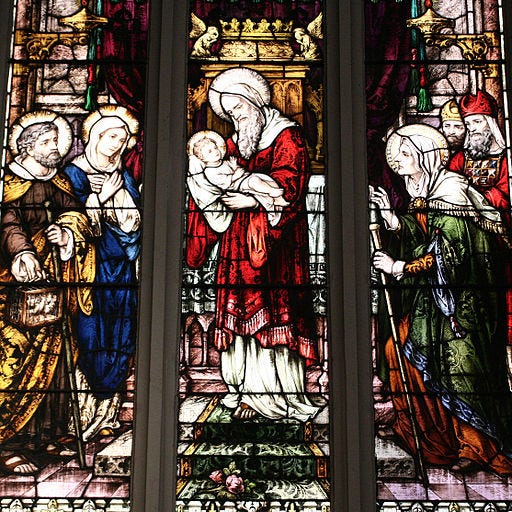
February 2 is the Feast of the Presentation of Our Lord Jesus Christ in the Temple, also known as Candlemas or the Feast of the Purification.
In more traditional, liturgical churches, infant baptism is how newborns become a part of the church.
However, in churches that practice believer baptism, like mine, we have a different way to welcome babies who are born into the church: dedication. Baby dedication is an opportunity to bring a child before both the Lord and the church congregation and proclaim that the newborn belongs to God. Usually, the parents are asked to confirm their own faith, and then they are charged with bringing the child up in the faith. The little one is prayed over and celebrated.
This tradition is actually based on an ancient Jewish practice found in Scripture. When a male child was born, specifically the firstborn male, the child would be dedicated to the Lord:
Consecrate to me all the firstborn. Whatever is the first to open the womb among the people of Israel, both of man and of beast, is mine.1
And just a few verses later:
Every firstborn of man among your sons you shall redeem.2
And of course, since Jesus was the firstborn male of a Jewish family, he himself was dedicated to the Lord in the Temple in Jerusalem, forty days after his birth. We celebrate this event on February 2, forty days after Christmas Day.
why forty days?
Why did they wait forty days to dedicate Jesus? This was also common practice in Judaism in Jesus’ day, and it was because of another Jewish law regarding the purification of a mother after giving birth. Leviticus tells us that after a male child is born, the mother is considered ritually unclean for forty days. At the end of forty days, she must go to the priest and present a sacrifice for her purification.3
The Gospel of Luke tells us of Jesus’ presentation and Mary’s purification at the Temple:
And when the time came for their purification according to the Law of Moses, they brought him up to Jerusalem to present him to the Lord (as it is written in the Law of the Lord, “Every male who first opens the womb shall be called holy to the Lord”) and to offer a sacrifice according to what is said in the Law of the Lord, “a pair of turtledoves, or two young pigeons.”4
That last detail actually tells us something very interesting. Joseph and Mary sacrificed a pair of turtledoves or pigeons. According to Leviticus 12, the proper sacrifice was a one-year-old lamb, unless the family was too poor to afford a lamb, in which case two turtledoves or pigeons would be substituted.5 Luke tells us then, if we hadn’t already figured it out, that Jesus was not born into wealth and privilege, but into poverty.
the song of Simeon
At Jesus’ dedication, his family met an old man named Simeon, who had been promised that he would not die before seeing the messiah.6 Simeon came to the Temple that day, and when he saw the baby he took him in his arms and prayed:
Lord, now you are letting your servant depart in peace,
according to your word; for my eyes have seen your salvation that you have prepared in the presence of all peoples, a light for revelation to the Gentiles,
and for glory to your people Israel.7
The early church found this prophetic prayer so moving that by the fourth century, they had turned it into a prayer often used in the evening or night, before bed, just as Simeon prayed it in the evening of his life. In Latin it is known as the Nunc Dimittis8 and in English, the Song of Simeon. Of course, there’s no indication that Simeon sang this prayer, but that doesn’t stop people from putting it to music:
Simeon’s prayer reminds us of several things; I’d like to touch on two.
First, God keeps his promises. Luke doesn’t explicitly tell us that Simeon was old, but he says he’s ready to “depart in peace,” that is, die. He had waited a long time for a glimpse of the promised messiah. It might take longer than we want, hope, or expect, but God keeps his promises.
Second, the salvation brought by Israel’s messiah was meant for everyone. Simeon calls Jesus “a light for revelation to the Gentiles.” Jesus later tells the Samaritan woman that “salvation is from the Jews,”9 but it was always meant for everyone: “Go therefore and make disciples of all nations.”10 We should thank God every day that he sent a light for us.
The Latin-speaking church liked to name prayers and songs by just saying the first two words. Nunc Dimittis is Latin for “Now let depart.”




